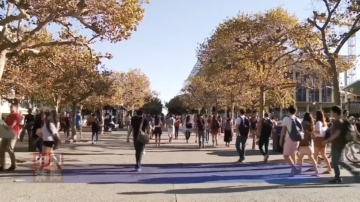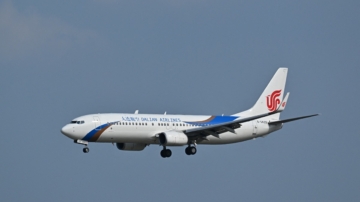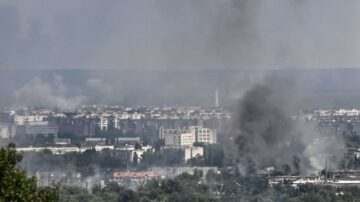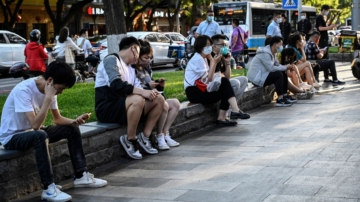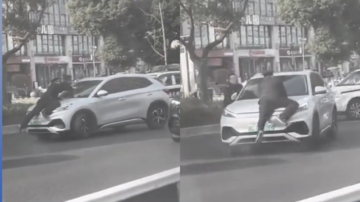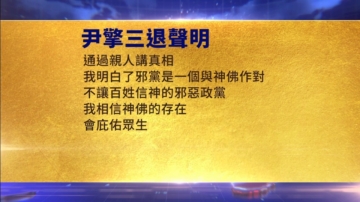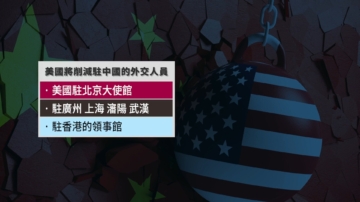【新唐人2011年8月1日讯】温州“动力火车”撞毁事故29号“头七”,中国大陆全国多家报纸不约而同,准备好许多版位报导事件,并悼念死难者,但却在中宣部的禁令下撤版,有些报章以近乎“开天窗”方式,表示不满。不过,仍有大批媒体抗命。其中,《经济观察报》以八个版面的“特别报导”,详细分析了“温州动车事故”。
从7月30号开始,“温州动车追撞事故”的相关报导,进入噤声期。
29号晚9点左右,中共政治局常委李长春长期控制的“中宣部”,连续下达3道封杀令,对于大陆媒体报导温州动车事故,“除正面报导和权威部门发布的动态消息外,不再做任何报导,不发任何评论。”
一名广州报社的资深编辑透露:当晚,百家报纸在撤版,千位记者被毙稿。
据了解,《21世纪经济报导》和财经周报《中国经营报》接到禁令后,各自撤下8个相关版面﹔《新京报》、浙江的《钱江晚报》和西安《华商报》等也都撤下了原本准备好的版面。
中宣部的禁令引起了大陆媒体的强烈反应。上海《青年报》、《东方早报》和广州《南方都市报》等,都以“开天窗”的方式表达不满。此外,有多家报社的编辑在微博上贴出了被撤下的版面,也有记者在个人微薄上转播再也无法上版的新闻。
不过,中共当局镇压舆论的铁腕作风,反而引爆中国近年罕见的“媒体抗命潮”。
上海《青年报》30号头版,是以获救的小女孩伊伊笑脸图片,配以“伊伊,一定要好好长大”的文字,玩擦边球,继续报导事故真相。
《经济观察报》30号同样以醒目的标题≪温州没有奇迹≫,揭开了8篇强有力的问责。其中问:≪谁是真凶≫、≪铁道部在掩饰甚么?≫。还提了一些设想,例如≪全国人大应启动特别调查程序≫、≪请为死难者立碑≫、≪请敬畏生命≫、≪分拆铁道部≫等等…。《经济观察网》还以“经济观察报九评 温州动车追尾事故”专题,评论这起事件。
而《新京报》将原本的头版改为北京暴雨,但以《7日雨未绝,1天2预警》为标题,似乎想用气象比喻心境。
有报社编辑呼吁报社老总鼓起勇气抵制禁令,“站着把新闻做了”。媒体人阿丁说:“媒体老总们,请在此刻积蓄勇气、唤醒良知……禁令是用来突破的不是用来奴才听令的,绳索是用来挣脱的不是拿来自缚手脚的。”
《蘋果日报》报导,大陆传媒研究者统计发现,29号至少有近百家“都市类报纸”,引用温家宝“要给群众真相”、“是否救人第一,铁道部要回答”等做头版大题,形成“千夫指向铁道部”舆论倾向。这和2008年5.12“四川大地震”后的沉默相比,大陆媒体在温州火车事故中显然“人性”有所擡头。然而, “人性”的一面最终会不会战胜“党性”,令人拭目以待。
《九评共产党》书中“以党性取代和消灭人性”写道:“共产党员以及共产社会的人民首先被要求的,是绝对的服从,这是所谓组织路线的全部内容。……按照共产党的要求,(党性)永远超越普遍人性而存在。……一个党员,无论他在私下对你表达了怎样的意见,但一旦作为党员表态时,必然要和‘组织’保持一致。”
新唐人记者吴惟、周昕屹综合报导
Banning Train Crash Reports
After the major crash of high-speed train near Wenzhou,
many Chinese newspapers were preparing feature reports
on the incident and to mourn the crash victims.
However, the Chinese Central Propaganda Department
(CCPD) issued orders to ban such reports.
Some newspapers left the pages blank
to express their dissatisfaction.
However, a large number of media still disobeyed.
For example, Economic Observer News published 8 pages
of "special reports" to analyze the crash.
Since July 30, no report on "Wenzhou high-speed rail crash"
is allowed to be published.
On July 29, CCPD issued three consecutive orders
to ban all mainland reports on Wenzhou high-speed rail crash,
demanding “no more reports and no more comments
besides reporting positive news and info issued by authorities.”
A senior editor of a Guangzhou-based newspaper said,
“Tonight, hundreds of newspapers change pages;
thousands of journalists' articles are rejected.”
It is said that 21 Century Business Herald and
China Business changed eight relevant pages.
Beijing News, Qianjiang Evening News, China Business Daily
also changed their original planning.
CCPD's prohibition caused strong reactions
from the media.
Youth Daily, Shanghai's Oriental Morning Post and
Southern Metropolitan Daily
all left their pages blank to express their dissatisfaction.
Also, editors of many newspapers posted the original pages
on micro-blogs;
journalists posted some never-to-be-published news articles
on their personal micro-blogs.
The communist authorities' high-handed suppression of
public opinion ignited the Chinese media's disobedience.
It is rarely seen in recent years.
On July 30, Youth Daily's headline was a smiling Yiyi,
an infant girl that was rescued from a crashed train carriage,
with the words, “Yiyi, you must grow up well.”
Thus, it was able to continue reporting the truth indirectly.
Also on July 30, Economic Observer News published
eight articles of powerful criticism
with a striking title “No miracles in Wenzhou”.
The articles were “Who is the real killer?” and
“What is the Ministry of Railways trying to hide?”
It also provided some suggestions, such as
“National Congress should start a special investigation,”
“Please construct monuments for crash victims”,
“Please respect people's lives”, “Split the Ministry of Railways”.
Economic Observer News also commented on this incident
with a special topic “The Nine Commentaries on Train Crash.”
Beijing News changed its first page to report
the downpour in Beijing, with the title
“Endless Raining for Seven Days;
Two Warnings per day,” linking its feeling to the weather.
A newspaper editor called for the newspaper executives'
courage to resist the ban.
Media professional A Ding said,
“The media gurus, please gather your courage
and awake your conscience at this moment…
The ban should be broken, not to be obeyed by slaves.
The rope should be cast away, not be used to tie people."
According to Apple Daily, mainland media researcher found,
on July 29, nearly a hundred of municipal newspapers
quoted Wen Jiabao, such as “give the truth to people”,
forming a consensus of questioning the Ministry of Railways.
Compared with the total silence after the
Sichuan earthquake in 2008,
mainland media exhibited their human feelings
on Wenzhou rail crash.
However, whether this “human nature” can conquer the
Communist “party nature” or not, let's wait and see.
The book “Nine Commentaries on the Communist Party”
on “How Party Nature Replaces and Eliminates Human Nature”:
“The first and foremost requirement of all CCP members and
those ruled by the CCP is to obey commands unconditionally.
This is what the organization line is all about……
But placed above human nature and feelings is the Party nature,
which, according to the requirements of the Communist Party,
transcends humanity.
A Party member must remain consistent with the Party line
when speaking publicly, no matter how he feels privately. ”
NTD reporters Wu Wei and Zhou Xinyi
从7月30号开始,“温州动车追撞事故”的相关报导,进入噤声期。
29号晚9点左右,中共政治局常委李长春长期控制的“中宣部”,连续下达3道封杀令,对于大陆媒体报导温州动车事故,“除正面报导和权威部门发布的动态消息外,不再做任何报导,不发任何评论。”
一名广州报社的资深编辑透露:当晚,百家报纸在撤版,千位记者被毙稿。
据了解,《21世纪经济报导》和财经周报《中国经营报》接到禁令后,各自撤下8个相关版面﹔《新京报》、浙江的《钱江晚报》和西安《华商报》等也都撤下了原本准备好的版面。
中宣部的禁令引起了大陆媒体的强烈反应。上海《青年报》、《东方早报》和广州《南方都市报》等,都以“开天窗”的方式表达不满。此外,有多家报社的编辑在微博上贴出了被撤下的版面,也有记者在个人微薄上转播再也无法上版的新闻。
不过,中共当局镇压舆论的铁腕作风,反而引爆中国近年罕见的“媒体抗命潮”。
上海《青年报》30号头版,是以获救的小女孩伊伊笑脸图片,配以“伊伊,一定要好好长大”的文字,玩擦边球,继续报导事故真相。
《经济观察报》30号同样以醒目的标题≪温州没有奇迹≫,揭开了8篇强有力的问责。其中问:≪谁是真凶≫、≪铁道部在掩饰甚么?≫。还提了一些设想,例如≪全国人大应启动特别调查程序≫、≪请为死难者立碑≫、≪请敬畏生命≫、≪分拆铁道部≫等等…。《经济观察网》还以“经济观察报九评 温州动车追尾事故”专题,评论这起事件。
而《新京报》将原本的头版改为北京暴雨,但以《7日雨未绝,1天2预警》为标题,似乎想用气象比喻心境。
有报社编辑呼吁报社老总鼓起勇气抵制禁令,“站着把新闻做了”。媒体人阿丁说:“媒体老总们,请在此刻积蓄勇气、唤醒良知……禁令是用来突破的不是用来奴才听令的,绳索是用来挣脱的不是拿来自缚手脚的。”
《蘋果日报》报导,大陆传媒研究者统计发现,29号至少有近百家“都市类报纸”,引用温家宝“要给群众真相”、“是否救人第一,铁道部要回答”等做头版大题,形成“千夫指向铁道部”舆论倾向。这和2008年5.12“四川大地震”后的沉默相比,大陆媒体在温州火车事故中显然“人性”有所擡头。然而, “人性”的一面最终会不会战胜“党性”,令人拭目以待。
《九评共产党》书中“以党性取代和消灭人性”写道:“共产党员以及共产社会的人民首先被要求的,是绝对的服从,这是所谓组织路线的全部内容。……按照共产党的要求,(党性)永远超越普遍人性而存在。……一个党员,无论他在私下对你表达了怎样的意见,但一旦作为党员表态时,必然要和‘组织’保持一致。”
新唐人记者吴惟、周昕屹综合报导
Banning Train Crash Reports
After the major crash of high-speed train near Wenzhou,
many Chinese newspapers were preparing feature reports
on the incident and to mourn the crash victims.
However, the Chinese Central Propaganda Department
(CCPD) issued orders to ban such reports.
Some newspapers left the pages blank
to express their dissatisfaction.
However, a large number of media still disobeyed.
For example, Economic Observer News published 8 pages
of "special reports" to analyze the crash.
Since July 30, no report on "Wenzhou high-speed rail crash"
is allowed to be published.
On July 29, CCPD issued three consecutive orders
to ban all mainland reports on Wenzhou high-speed rail crash,
demanding “no more reports and no more comments
besides reporting positive news and info issued by authorities.”
A senior editor of a Guangzhou-based newspaper said,
“Tonight, hundreds of newspapers change pages;
thousands of journalists' articles are rejected.”
It is said that 21 Century Business Herald and
China Business changed eight relevant pages.
Beijing News, Qianjiang Evening News, China Business Daily
also changed their original planning.
CCPD's prohibition caused strong reactions
from the media.
Youth Daily, Shanghai's Oriental Morning Post and
Southern Metropolitan Daily
all left their pages blank to express their dissatisfaction.
Also, editors of many newspapers posted the original pages
on micro-blogs;
journalists posted some never-to-be-published news articles
on their personal micro-blogs.
The communist authorities' high-handed suppression of
public opinion ignited the Chinese media's disobedience.
It is rarely seen in recent years.
On July 30, Youth Daily's headline was a smiling Yiyi,
an infant girl that was rescued from a crashed train carriage,
with the words, “Yiyi, you must grow up well.”
Thus, it was able to continue reporting the truth indirectly.
Also on July 30, Economic Observer News published
eight articles of powerful criticism
with a striking title “No miracles in Wenzhou”.
The articles were “Who is the real killer?” and
“What is the Ministry of Railways trying to hide?”
It also provided some suggestions, such as
“National Congress should start a special investigation,”
“Please construct monuments for crash victims”,
“Please respect people's lives”, “Split the Ministry of Railways”.
Economic Observer News also commented on this incident
with a special topic “The Nine Commentaries on Train Crash.”
Beijing News changed its first page to report
the downpour in Beijing, with the title
“Endless Raining for Seven Days;
Two Warnings per day,” linking its feeling to the weather.
A newspaper editor called for the newspaper executives'
courage to resist the ban.
Media professional A Ding said,
“The media gurus, please gather your courage
and awake your conscience at this moment…
The ban should be broken, not to be obeyed by slaves.
The rope should be cast away, not be used to tie people."
According to Apple Daily, mainland media researcher found,
on July 29, nearly a hundred of municipal newspapers
quoted Wen Jiabao, such as “give the truth to people”,
forming a consensus of questioning the Ministry of Railways.
Compared with the total silence after the
Sichuan earthquake in 2008,
mainland media exhibited their human feelings
on Wenzhou rail crash.
However, whether this “human nature” can conquer the
Communist “party nature” or not, let's wait and see.
The book “Nine Commentaries on the Communist Party”
on “How Party Nature Replaces and Eliminates Human Nature”:
“The first and foremost requirement of all CCP members and
those ruled by the CCP is to obey commands unconditionally.
This is what the organization line is all about……
But placed above human nature and feelings is the Party nature,
which, according to the requirements of the Communist Party,
transcends humanity.
A Party member must remain consistent with the Party line
when speaking publicly, no matter how he feels privately. ”
NTD reporters Wu Wei and Zhou Xinyi

